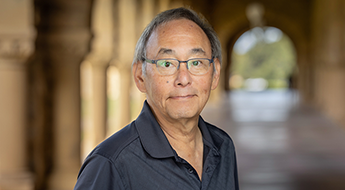Can Conversations with Friends Bridge the Partisan Divide on Climate Change?
Mary McGrath shows that structured, collaborative discussions with friends and family can shift opinions
Get all our news
This gave me, personally, a great deal of hope that those conversations can be really important, really meaningful for our democracy [and] our society. ”
Mary McGrath
IPR political scientist

Right before Thanksgiving a few years ago, IPR political scientist Mary McGrath gave a talk about Americans’ attitudes on climate change to an audience made up largely of students. She shared evidence of a deep political divide around the issue, which felt depressing. To end the talk on a hopeful note, she wondered: Why not encourage students to talk to someone they knew who was skeptical of climate change over the holiday?
But McGrath hesitated. She knew there was no research showing that those conversations would be useful or make skeptics more likely to support action on climate change. This led her to start investigating whether people could have productive conversations with their friends and family if they were given the right tools.
Her new research reveals that after going through a guided discussion program, pairs of friends and family members with opposite views about climate change were less polarized about their beliefs. People skeptical of climate change were more likely to see it as a serious problem that needed to be addressed—a change that lasted at least three months after going through the intervention.
“There was a decrease in polarization, driven by those people who were on the climate skeptical end of things moving toward their climate advocate partner,” McGrath said.
To conduct the study, McGrath partnered with a large international climate advocacy organization to recruit people with a friend or family member who held climate views opposite to their own and who were open to participating in the program with them. Between May and June 2023, the participants met virtually with their partner across four weeks and worked together through an online discussion guide relating to a book excerpt about climate change. Each pair consisted of a climate "skeptic," who doubted the science behind climate change or the need for urgent action, and a climate "advocate," who believed the climate is changing and that we need to act now to stop it.
Participants took a survey a week before the discussions began, a week after them, and three months following the program, and they also completed an exit interview with a member of the research team after finishing the discussions. The survey results show that polarization around climate change decreased from before to after the program.
Of the six questions asked in the survey, climate skeptics shifted the most at the end of the intervention in their response to: “How high of a priority should action on climate change be for the president and Congress?”
McGrath says this change is interesting because there was nothing overtly political in the book or the discussion guides. Something pairs tended to agree on was that individual actions would not be enough to combat climate change, compared to large-scale interventions.
While many people are reluctant to have political conversations with friends or family they don’t agree with, McGrath says, the participants reported that the personal relationship they had with their partner ended up helping in the discussion of a divisive topic. In interviews, both climate advocates and climate skeptics emphasized the importance of approaching the conversations with mutual respect and accepting the concerns the other person raised as valid even if they weren’t shared.
“That seemed to be key to the process—that both people had this sense that the other one wasn't trying to win,” she explained.
The guided discussions were designed around a collaborative framework, and the partners established a shared goal at the beginning of the program, which they revisited each week. McGrath said the collaborative approach to the discussions shows that how you frame these kinds of conversations matters.
The study suggests that when people enter these conversations “with this more collaborative mindset, they can be productive in a way that does not put that relationship at risk,” McGrath said.
She plans to look at whether this intervention would work with people who don't already know each other. She’s also in the process of studying how this model works in discussions about democracy between people who have a personal relationship but opposing political views.
McGrath said that it’s understandable that people are reluctant to strain personal relationships by talking about contentious political topics, but that participants reported that the conversations about climate change went much better than they expected.
“This gave me, personally, a great deal of hope that those conversations can be really important, really meaningful for our democracy [and] our society,” she said.
Mary McGrath is assistant professor of political science and an IPR fellow.
Photo credit: iStock
Published: March 25, 2025.


